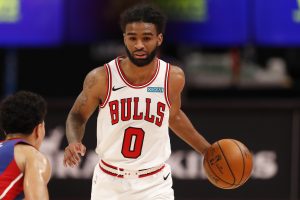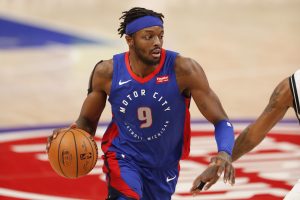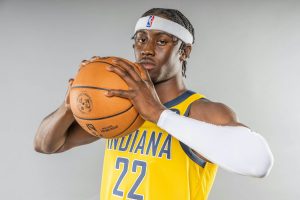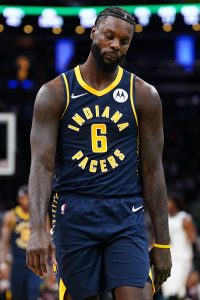With the NBA’s February 10 trade deadline around the corner, we’re taking a closer look at all 30 teams, breaking down their potential plans for the deadline and identifying their most likely trade candidates. We’re focusing today on the Central Division.
Chicago Bulls
Trade deadline goals:
After acquiring Nikola Vucevic at last season’s deadline, the Bulls completed sign-and-trade deals for DeMar DeRozan and Lonzo Ball in the offseason, signaling they were prepared to go all-in to contend. Those moves have paid off, as Chicago currently controls the No. 1 seed in the East with a 32-19 record.
However, injuries have put a damper on the Bulls’ success. Young forward Patrick Williams will miss most, if not all, of the season after undergoing wrist surgery in October. And Ball, Alex Caruso, and Derrick Jones are all sidelined with various ailments that have projected recovery timelines of at least six-to-eight weeks.
Chicago’s health problems have complicated the team’s plans at the deadline. Does it make sense to continue the all-in push this season with no guarantee that the rotation will be 100% healthy this spring? If so, what’s the greatest area of need? Do the Bulls need a forward to help make up for the losses of Williams and Jones, or has the backcourt become a more pressing concern with Ball and Caruso unavailable?
For now, there’s no reason to believe Ball and Caruso won’t be back for the playoffs, but the same can’t necessarily be said of Williams, whose relative inexperience is another factor that must be considered as the team weighs its top deadline priorities. While the Bulls could certainly look to add another guard (they’ve been linked to Dennis Schröder), I expect power forward to be the prime position of concern.
Top trade candidates:
 Coby White was drafted by the Bulls’ previous front office regime and hadn’t established himself as a foundational player entering this season, so he was viewed a couple months ago as one of the team’s clearest trade candidates.
Coby White was drafted by the Bulls’ previous front office regime and hadn’t established himself as a foundational player entering this season, so he was viewed a couple months ago as one of the team’s clearest trade candidates.
However, White has taken advantage of a series of backcourt absences and has played some of the best basketball in his career in recent weeks, raising doubts about whether Chicago can actually afford to part with him. I think he could still be on the move in the right deal, but the odds of him being dealt have decreased significantly.
A team laser-focused on winning a championship in the short term would likely be open to trading Williams for a healthier and more playoff-tested veteran, but the Bulls have signaled they’re not eager to discuss the former No. 4 overall pick, who was the first player drafted by president of basketball operations Arturas Karnisovas. Even if Williams doesn’t end up contributing much this season, the Bulls still love his long-term potential and won’t sacrifice him in any deal that doesn’t substantially improve their title chances.
If White and Williams are off the table, the Bulls may be limited to shopping the likes of Jones, Troy Brown, Marko Simonovic, and a handful of reserves. The team has traded away two of its future first-round picks, reducing the number of draft assets it could use to sweeten its offers, but does control Portland’s lottery-protected 2022 first-rounder. That’s probably the pick trade partners will be after in any negotiations with the Bulls.
Cleveland Cavaliers
Trade deadline goals:
For the first time since LeBron James was a Cavalier, we’re approaching a trade deadline wondering what moves Cleveland can make to increase its odds of making a deep playoff run that spring, rather than what moves the club will make to improve its long-term outlook.
The Cavaliers’ jumbo frontcourt has been a massive success, and with Jarrett Allen, Evan Mobley, and Lauri Markkanen locked into their respective roles, the team doesn’t need to add reinforcements up front. However, Cleveland has been in the market for help on the wing since last summer, and season-ending injuries to Ricky Rubio and Collin Sexton have the club eyeing potential backcourt upgrades as well.
Caris LeVert, Terrence Ross, Eric Gordon, and Dennis Schröder are among the players who have been cited as possible deadline targets for the Cavs.
While Cleveland will do its best to add one of those players or another veteran who can play a rotation role, it doesn’t sound like the team is eager to sacrifice valuable assets for the future. According to one recent report, the Cavs are trying to upgrade their roster using a couple second-round picks instead of parting with a first-rounder.
Top trade candidates:
Until he tore his ACL, Rubio looked like a candidate for a contract extension, not a trade. But his $17.8MM expiring contract now makes him Cleveland’s best salary-matching piece in a bigger deal.
While it’s obvious the Cavs are willing to move Rubio, it remains unclear what the plan is for their other injured guard. Sexton will be a restricted free agent this summer, and his knee surgery means the Cavs may be able to sign him to a much more team-friendly deal than they initially expected. He’d have value as a trade chip, but I expect Cleveland will try to avoid moving him if possible.
Kevin Love had been on the trade block for years entering this season, but was never dealt because no other teams wanted his oversized contract. I expect another trade deadline to come and go without Love changing teams, but his situation has changed — he’s having a nice bounce-back season and is thriving in a reserve role, providing far more value to the Cavs in that role than he would in a trade.
Dylan Windler, Kevin Pangos, and a handful of other bench players could be had, but won’t have much value. Unless they’re willing to move Sexton or Cedi Osman, the Cavs’ ability to upgrade their roster may ultimately come down to what kinds of draft picks they put in their offers. Second-round picks will be enough for certain trade targets, but a first-rounder would open up more doors.
Detroit Pistons
Trade deadline goals:
The Pistons’ 12-39 record is the NBA’s second-worst mark. They’re not contending for a playoff spot this season, and given how competitive the East has gotten, they may not be in the mix for a postseason berth in 2023 either.
With that in mind, Detroit will be taking the long view as the February 10 deadline approaches. I expect the club to focus on adding more draft picks and taking fliers on young players who may have fallen out of favor with their current teams, such as Marvin Bagley III.
While it’s possible the Pistons could make a move for someone who could contribute right away, it would only make sense to do so if that player is controllable for several years — either on a long-term contract or as a pending restricted free agent whose Bird rights Detroit would acquire in any trade.
Top trade candidates:
 Jerami Grant is one of this winter’s top trade candidates, and the Pistons appear to be in good position to extract a significant return for the veteran forward. There are several contending teams in the market for an impact two-way player, and Grant is under contract beyond this season, making him an appealing target.
Jerami Grant is one of this winter’s top trade candidates, and the Pistons appear to be in good position to extract a significant return for the veteran forward. There are several contending teams in the market for an impact two-way player, and Grant is under contract beyond this season, making him an appealing target.
Still, there’s no guarantee the Pistons will move Grant. A number of his potential suitors – such as the Lakers and Jazz – aren’t armed with the sort of draft picks and young prospects Detroit would want, which may limit the team’s ability to create a bidding war.
Rumors that Grant will want a prominent offensive role and a four-year, $112MM extension (the maximum he could get prior to free agency) from his new team may also make some clubs nervous.
If Grant stays put, it could be a pretty quiet deadline for the Pistons. They have other players they’d certainly be open to dealing – Cory Joseph, Josh Jackson, and Rodney McGruder, among others – but none of them are nearly as valuable as Grant.
Indiana Pacers
Trade deadline goals:
The 2021/22 trade rumor season unofficially got underway when a report nearly two months ago stated the Pacers were open to a roster shakeup and were making Domantas Sabonis, Myles Turner, and Caris LeVert available with the intent to be active.
While that story made it sound like there could be a fire sale in Indiana, subsequent reporting made it clear that’s probably not in the cards.
Pacers owner Herb Simon, who is 87 years old, has never been on board with a full-scale rebuild and is unlikely to sign off on one now, even though the case could be made that the time is right — at 19-34, the club seems to be bottoming out this season without intentionally tanking.
Unless Simon has a change of heart, our working assumption is that Indiana will be open to making a big deal or two that reshapes the roster without significantly pushing back the timeline for contention. The 2017 Paul George trade is a good point of reference — when they dealt George, the Pacers got back Sabonis and Victor Oladipo, not a collection of draft picks. That blueprint is the one they’ll probably want to follow if they move Sabonis, Turner, and/or LeVert.
Top trade candidates:
Sabonis and Turner are the most exciting trade candidates on the block for the Pacers, but LeVert and Justin Holiday are probably the ones who are more likely to be dealt.
 Indiana’s asking price for Sabonis is said to be very high, and Turner’s lingering foot injury muddles his trade value. It’s certainly not out of the question that one of the centers will be on the move, but I don’t get the sense the odds are better than 50/50 at this point.
Indiana’s asking price for Sabonis is said to be very high, and Turner’s lingering foot injury muddles his trade value. It’s certainly not out of the question that one of the centers will be on the move, but I don’t get the sense the odds are better than 50/50 at this point.
Outside of Sabonis, Turner, LeVert, and Holiday, the Pacers don’t really have any trade candidates that will move the needle for teams. Malcolm Brogdon isn’t eligible to be traded this season, T.J. McConnell and T.J. Warren are injured, and rookies Chris Duarte and Isaiah Jackson are believed to be off the table.
Milwaukee Bucks
Trade deadline goals:
The Bucks brought back most of their key contributors from last season’s championship roster, but they’ve clearly missed a pair of veterans this season: P.J. Tucker and Brook Lopez.
Milwaukee let Tucker walk in free agency, bringing in Semi Ojeleye on a minimum-salary contract in the hopes that he could play a similar role at a much lower price. That gamble hasn’t paid off. Ojeleye isn’t enough of a threat from beyond the three-point line to warrant much defensive attention, and while Ojeleye is a solid enough defender, Tucker was better. If the Bucks can find a way to acquire a versatile, defensive-minded forward who can be this year’s Tucker, they’ll jump at the opportunity.
As for Lopez, he’s still on the roster, but hasn’t played since the season opener due to back problems. He’s an important rim-protector for Milwaukee on defense and – like Tucker – hits just enough three-pointers to create problems for defenses that want to focus on the Bucks’ stars. Lopez’s return timeline remains unclear, but the Bucks will likely try to acquire at least a backup for him, if not an outright replacement.
Top trade candidates:
With Pat Connaughton and Grayson Allen playing well on the wing, it will be interesting to see if the Bucks move Donte DiVincenzo at the deadline. They got by without him in last year’s postseason and for most of the first half this season, and he’ll be a restricted free agent at season’s end.
DiVincenzo has reportedly drawn “considerable” trade interest and looks like the best and most obvious trade chip for a Milwaukee team that has traded away several future draft picks.
Jordan Nwora is another restricted-free-agent-to-be who would have positive value if the Bucks made him available. Veterans like Ojeleye, George Hill, and Rodney Hood could also be attached to certain deals, but won’t draw much – if any – interest on their own.


 Indiana’s asking price for Sabonis is said to be very high, and Turner’s lingering foot injury muddles his trade value. It’s certainly not out of the question that one of the centers will be on the move, but I don’t get the sense the odds are better than 50/50 at this point.
Indiana’s asking price for Sabonis is said to be very high, and Turner’s lingering foot injury muddles his trade value. It’s certainly not out of the question that one of the centers will be on the move, but I don’t get the sense the odds are better than 50/50 at this point. FEBRUARY 2: The Pacers will sign
FEBRUARY 2: The Pacers will sign